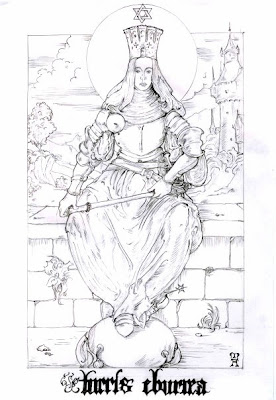Monday, June 2
Of Arms and the Woman I Sing: Or, O Decus Ecclesiae Virgo, the Plot Thickens
O decus Italiae virgo, quas dicere gratesWhich means:
quasue referre parem? sed nunc, est omnia quando
iste animus supra, mecum partire laborem.
Aeneas, ut fama fidem missique reportant
exploratores, equitum levia improbus arma
praemisit, quaterent campos; ipse ardua montis
per deserta iugo superans aduentat ad urbem.
Furta paro belli convexo in tramite silvae,
ut bivias armato obsidam milite fauces.
tu Tyrrhenum equitem conlatis excipe signis;
tecum acer Messapus erit turmaeque Latinae
Tiburtique manus, ducis et tu concipe curam.
O virgin glory of Italy, how should I attempt(Translation here.)
to thank you or repay you? But as your spirit
soars beyond us all, share the task with me.
Aeneas, so rumour says, and scouts sent out confirm,
has deployed his light cavalry to search the plains
thoroughly: he himself climbing the ridge, marches
through the desolate heights towards the town.
I am preparing an ambush on a deep track in the woods,
so as to block both entrances to the gorge with armed men:
you must wait for the Etruscan cavalry charge:
brave Messapus will be with you, and the Latin troops,
and Tiburtus’s band, and you must take command as leader.
A bit of background is helpful here. Camilla--who I really must add to Matt's List of Favorite Uppity Women--was the virgin-warrior queen of the Volsci tribe and a votary consecrated to the huntress Diana. In the Aeneid, she fights for her now-displaced tribe against Aeneas and the Trojans, eventually coming to a tragic end. Her militancy--she was said to be so fast as to be able to run across the sea without getting her toes wet--her royalty, and her virginity make for a wonderful pagan "type" for the Virgin Queen of Heaven, and thus explain at least some of the hymn's distinctive tone--though, apparently, not the Venus references, which one commenter below mentioned might have something to do with the planet Venus's role in navigation, which is further interlinked with the traditional puns on maria (Latin for oceans) and Maria the name. The Vergilian cleric I was talking to earlier seemed to recall some other maritime references in Virgil as well, that I am still trying to track down. Perhaps someone else out there is more familiar with the poem than I.
While the Marian hymn is not necessarily a full quotation, there's some deliberate overlap at the beginning, and I wouldn't be surprised if some of the other portions of O Decus Ecclesiae have some Vergilian resonances as well. Earlier on in Book XI, for instance, Camilla's girl warriors are arrayed in rich purple, just as Mary is described in the words "Ut pia purpurea tingit tua tempora amictus" towards the close of O Decus Ecclesiae. I have not been able to find any others so far, however. Once again, the comments of the more learned are welcome.
And, as a bonus, I include a small image of Our Lady as the Tower of Ivory, clad in the armor of chastity, that I did back in college. Not my best, but fun, anyway: my friend Mary R--'s first reaction was, "She looks ready to wallop someone." Sometimes people's mothers do.













